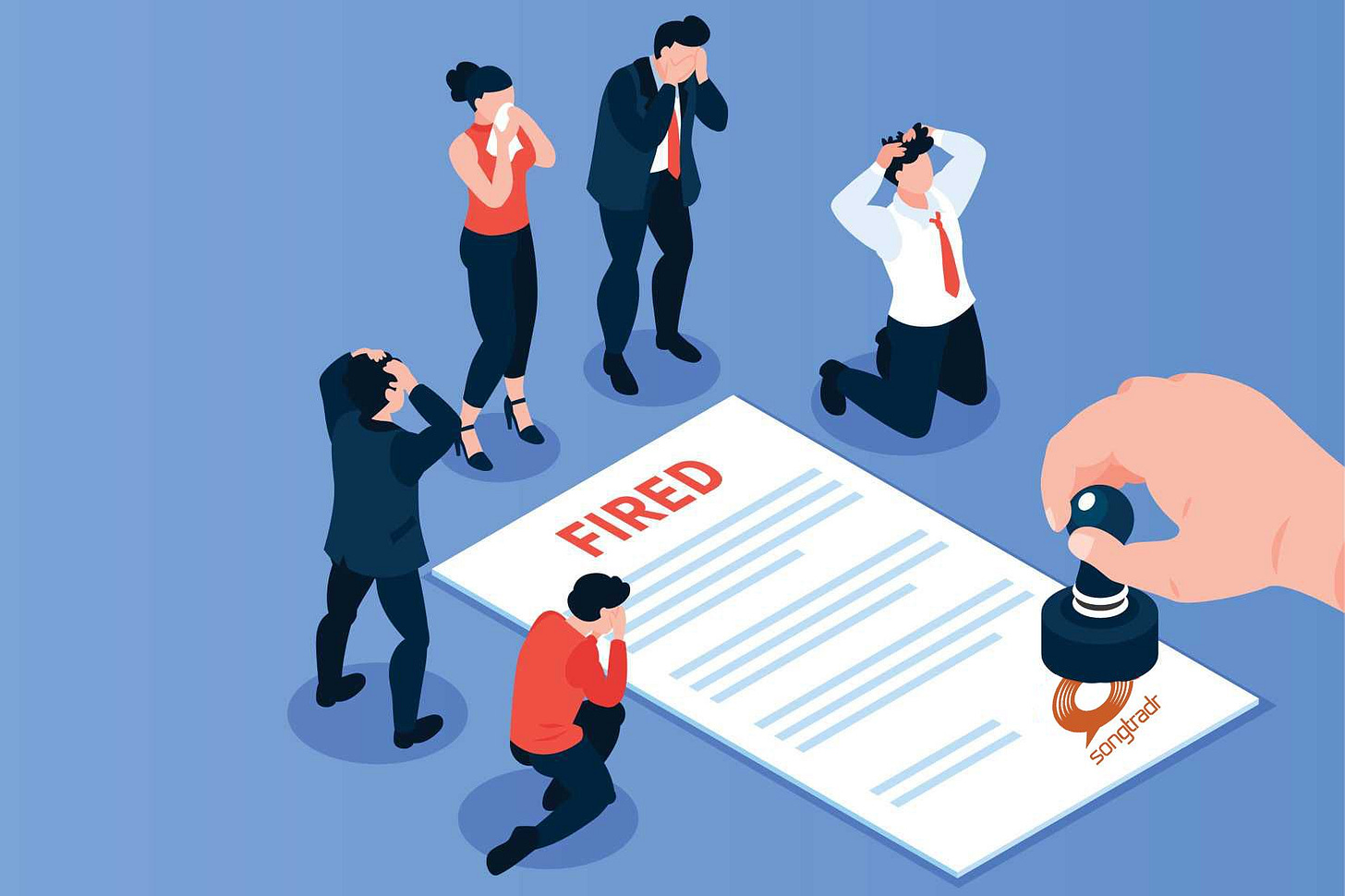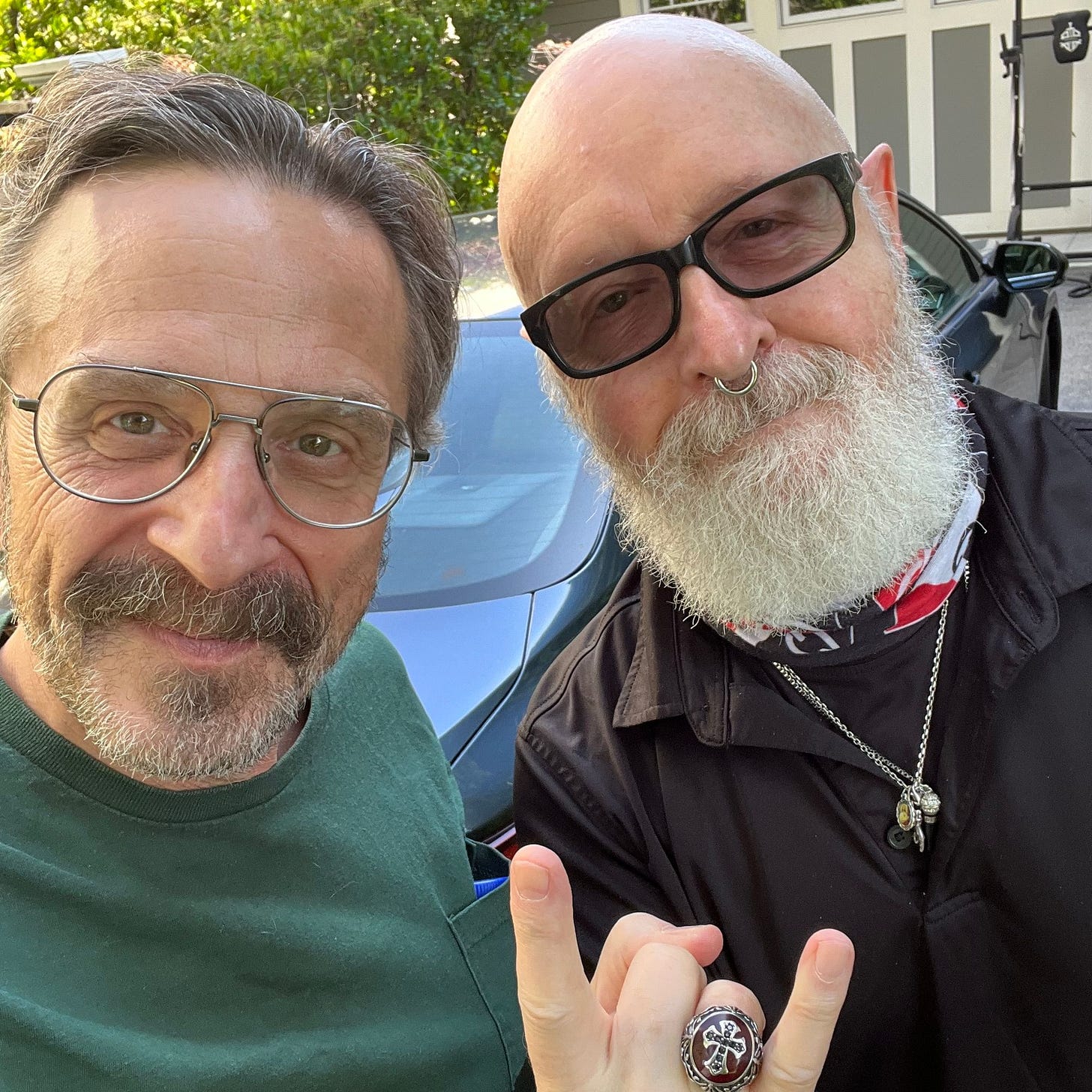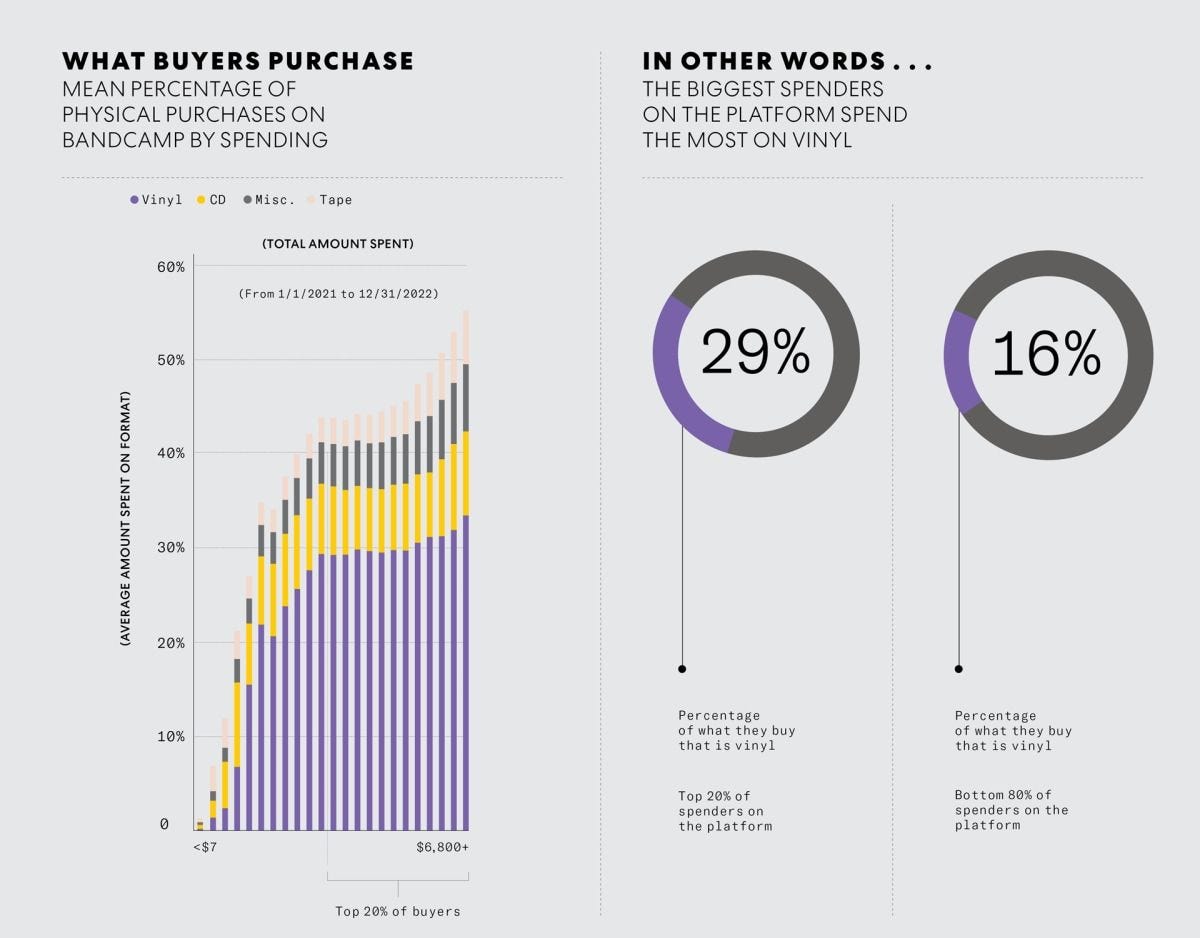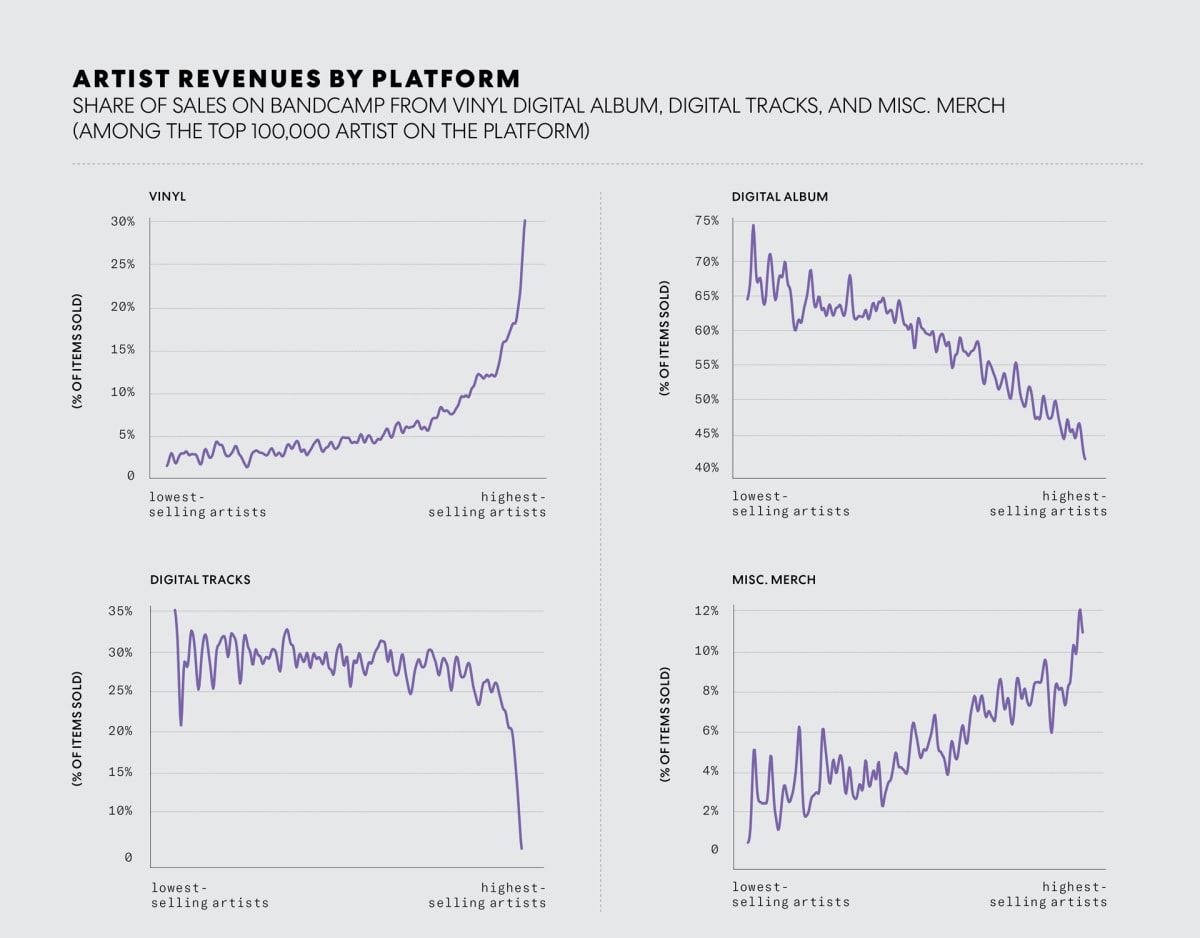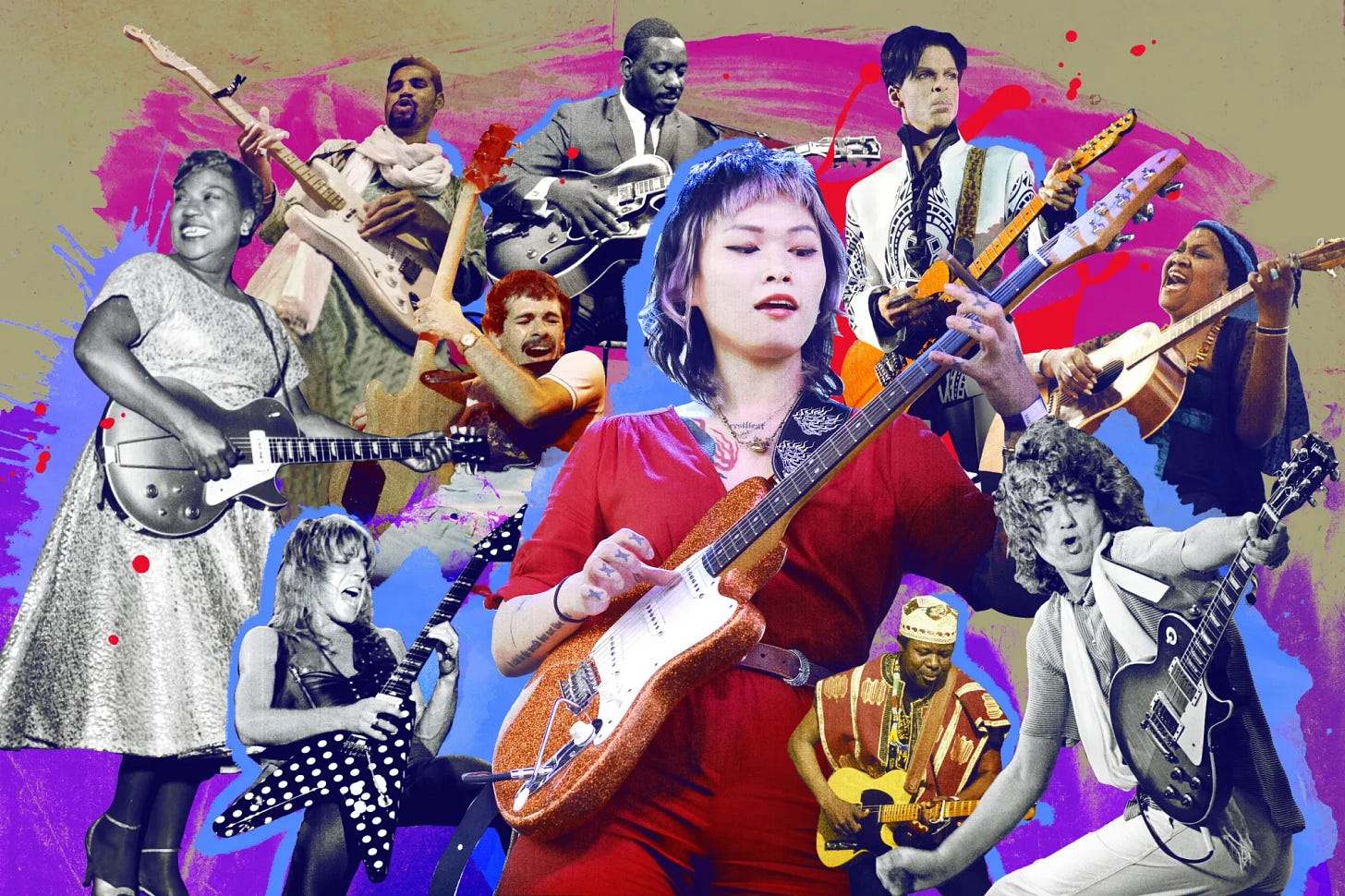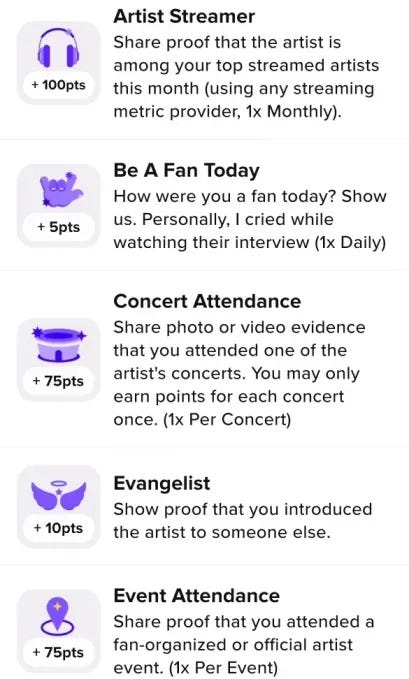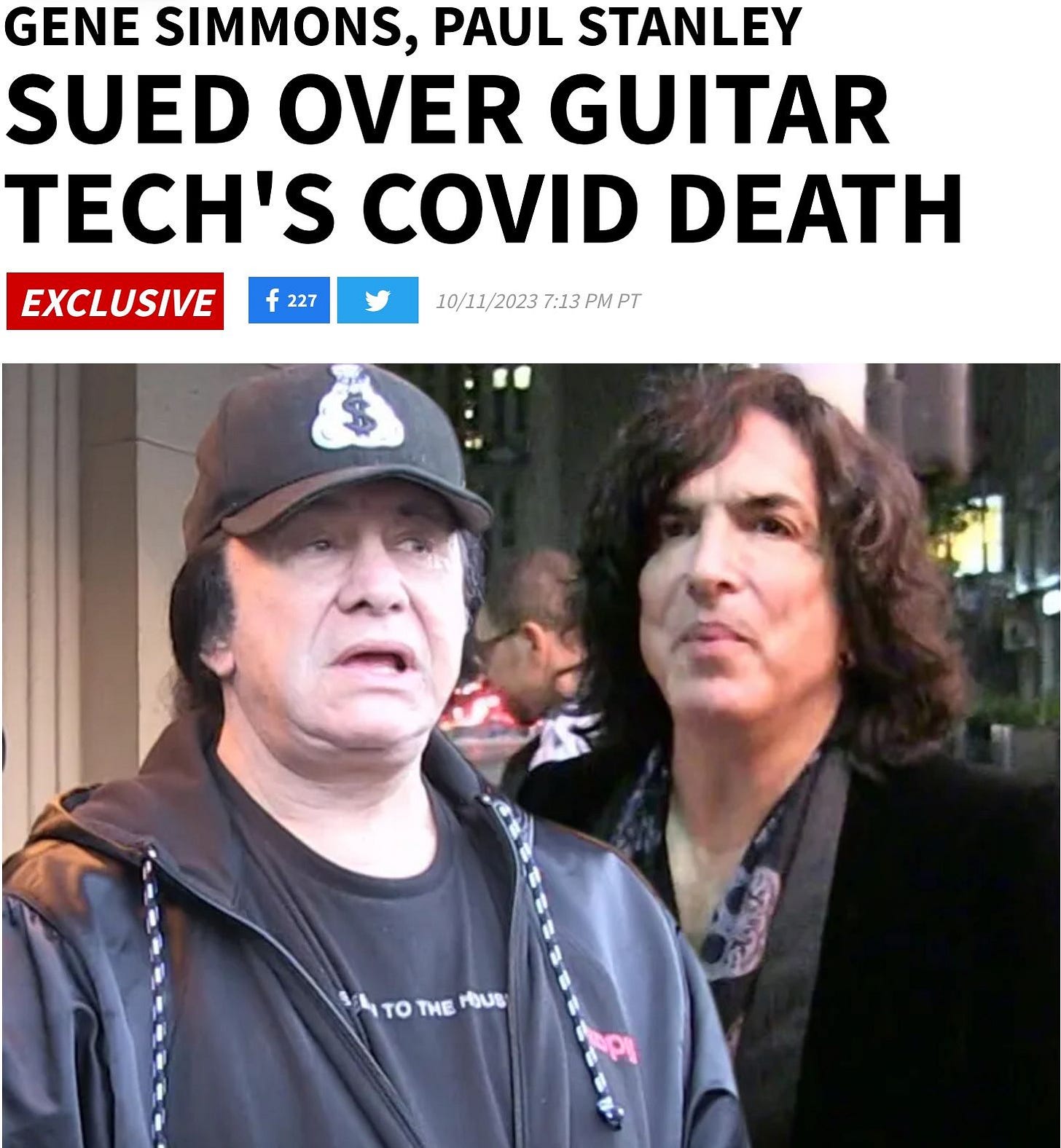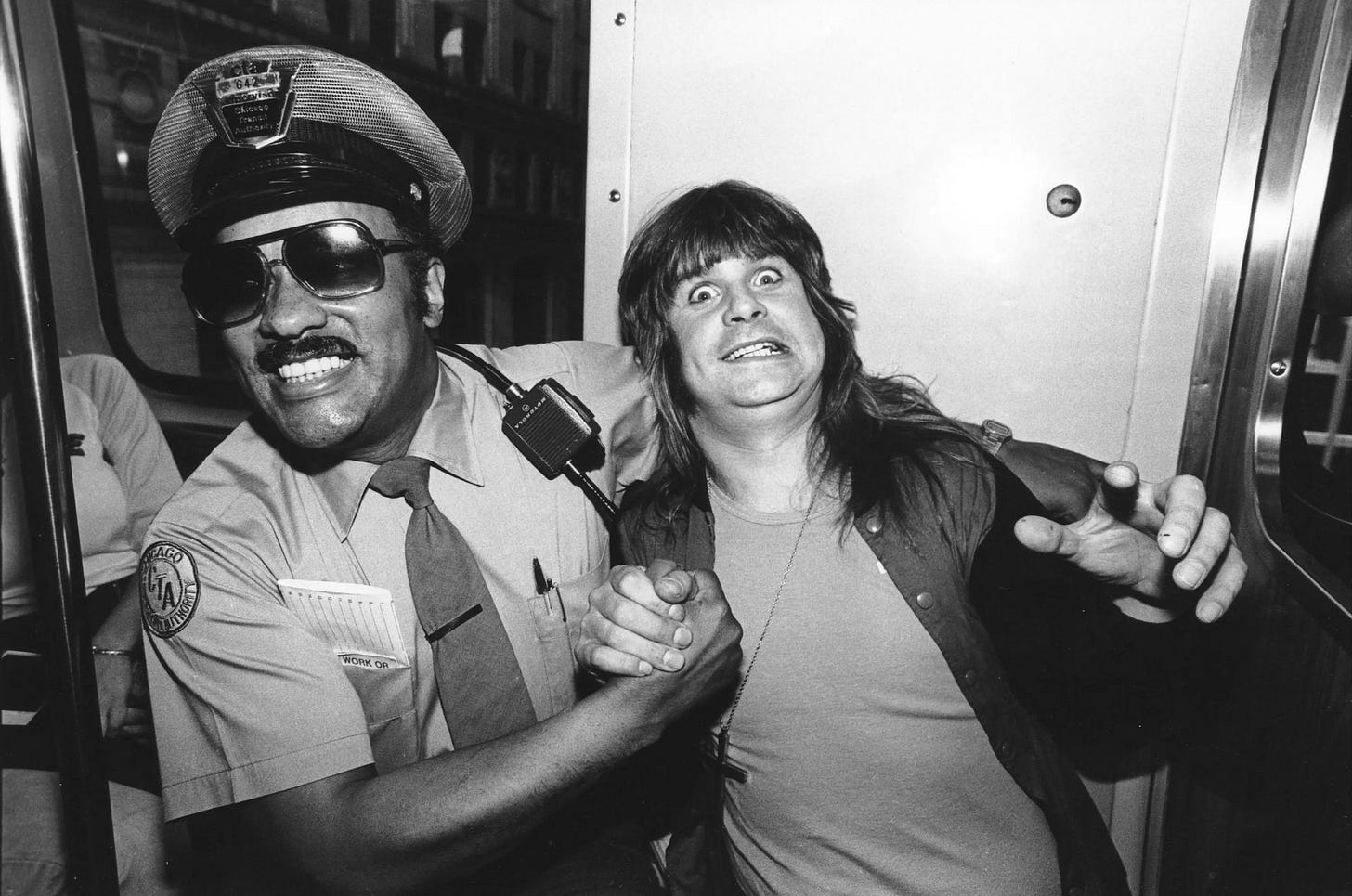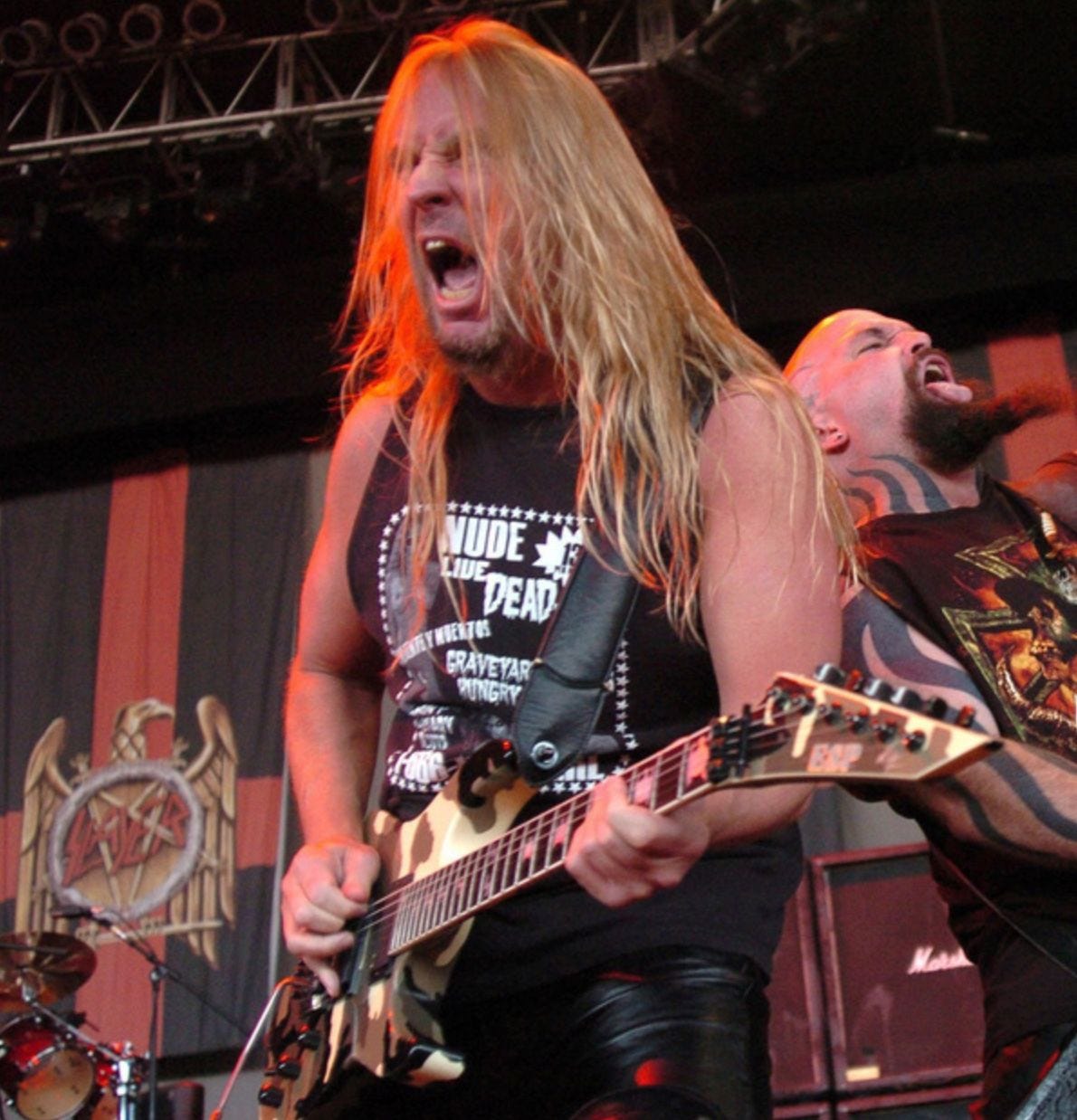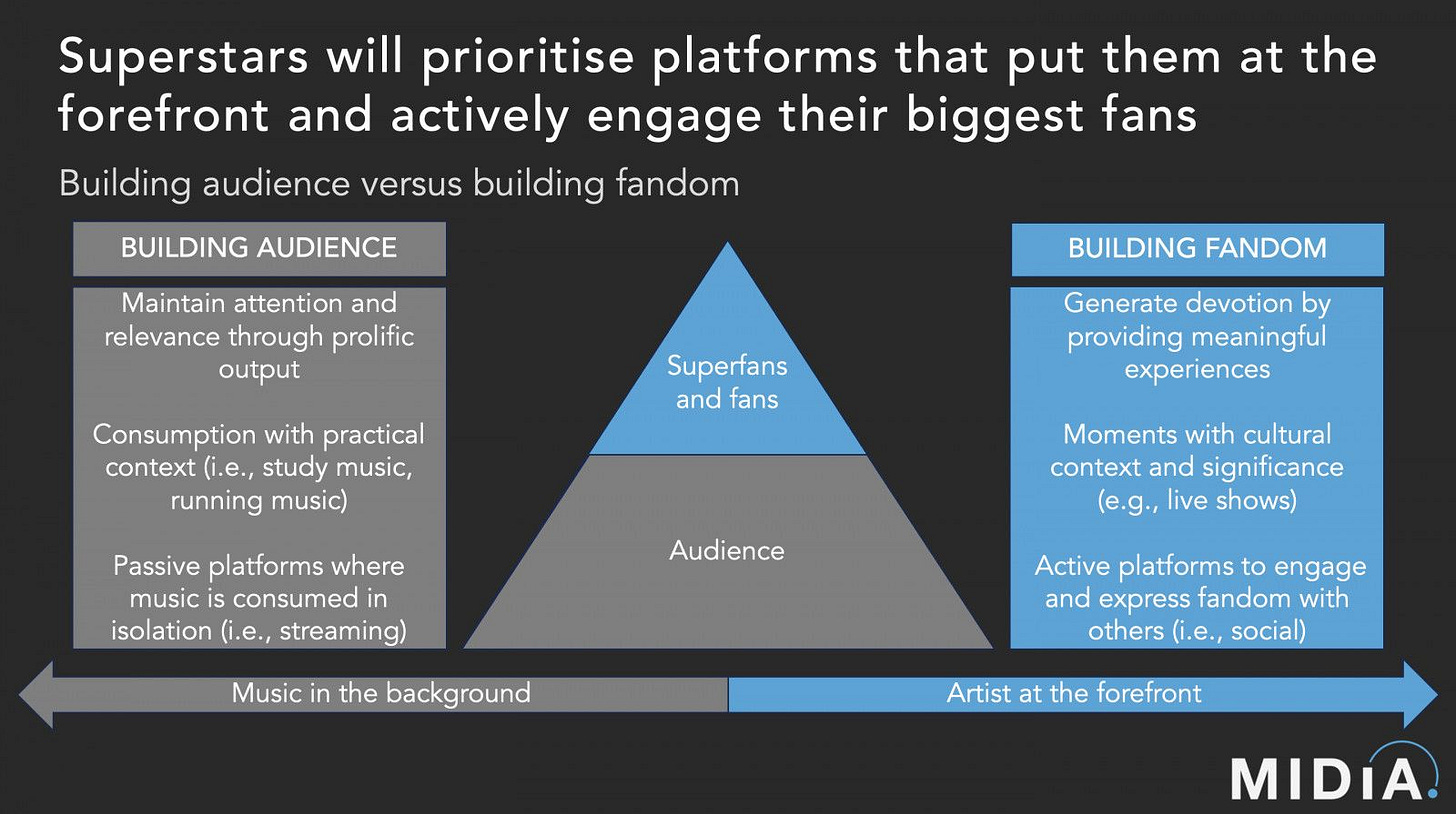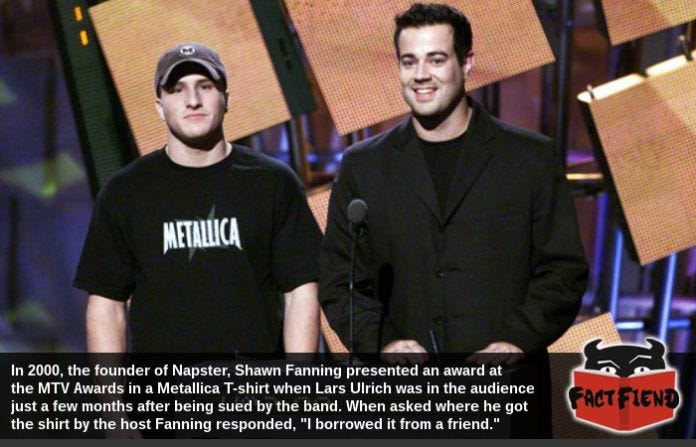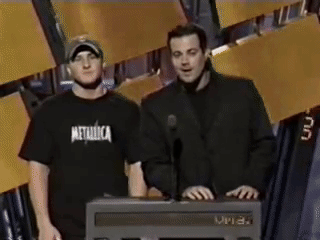Vol 128: Bandcamp Betrayal, Streaming's Struggle, and more

First...
Half of Bandcamp’s Staff Laid Off After Songtradr Acquisition
Half of the employees at Bandcamp, the artist-centric indie music platform, have been laid off just days after the company was acquired by Songtradr.
An extremely profitable company, uniquely beloved of musicians and music fans alike, riding a wave of public goodwill, decides to sell themselves to a billionaire who then dumps them off to another billionaire, who now fires half the company. 🌈 💩
Next...
Rob Halford on the WTF Podcast with Marc Maron
A good conversation between Maron and the Metal God worth checking out. It begins at 14:25, if you're like me and want to get right to the interview.
The Paradox of Streaming Profits
Spotify, Bandcamp, and the Vinyl Comeback
In the mid-2000s, the music industry faced two models: Spotify's streaming subscription and Bandcamp's pay-what-you-want setup, inspired by Radiohead’s 2007 album release strategy. Today, Spotify boasts a $26 billion market cap but has seen 14 out of the past 19 quarters in the red since going public in 2018. On the other hand, Bandcamp, with just $20 million in net revenue in 2022, is profitable due to its lean model. [Note: Extremely lean now that 50% of the company was fired]
The difference between the two lies in their payment structures. Spotify caps user spending at $10.99/month, while Bandcamp offers limitless potential, with variables such as national pride and charitable association affecting purchase decisions. This structure allows Bandcamp to benefit from fat-tailed distributions, where a minority of users generate most sales. For instance, top spenders on Bandcamp heavily purchase physical items, with vinyl being the most popular.
Speaking of vinyl, its sales reached $1.2 billion in 2022, the highest since 1988. Major artists like Taylor Swift and Harry Styles have leaned into this resurgence. This return to tactile experiences, which encompass more than just physical touch, is proving valuable. Vinyl offers a multi-sensory experience compared to Spotify's passive, ears-only stream.
The media theorist Marshall McLuhan defined tactility in the 1960s as more than mere physical touch, framing it as “that very interplay of the senses, which we call synesthesia”—the way we see and hear a bird chirp at the same time, or the multi-sensory operation of driving a car.
The tactile space, where we derive profound value and meaning—from concerts to sex to hiking, is defined by aesthetic qualities with a clear beginning, middle, and end. This understanding is vital as it explains the resurgence of vinyl and its implications even in music niches without a vinyl culture.
🧠
Tactility goes beyond the music industry. For instance, consumers see more value in purchasing an IMAX ticket for a tangible cinema experience than a one-time stream on Disney+. It's no surprise then that IMAX has reported a 38% YoY revenue increase in the first half of 2023, while Disney+ faces subscription losses.
Decades of low interest rates allowed ventures like Spotify to thrive, offering low-cost, non-tactile pleasures. However, as economic tides shift, companies might need to re-evaluate and embrace tactile experiences to genuinely connect with consumers.
TROLLING Stone
The 250 Greatest Guitarists*
*According to Rolling Stone.
Listicles are lazy and exist to generate clicks, usually due to outrage.
Rather than go on a long-winded diatribe, I'll instead highlight the hard rock/metal selections below.
#219 Glenn Tipton and K.K. Downing (current and former member of Judas Priest, respectively)
🧠
219!? Right here is when you should disregard the list. This disrespect is infuriating. Especially when you see who's next.
#218 Lzzy Hale (Halestorm)
#207 Justin Broadrick (Godflesh)
#197 Nuno Bettencourt (Extreme)
#189 Jerry Cantrell (Alice In Chains)
#161 Tim Henson (Polyphia)
#141 Fredrik Thordendal (Meshuggah)
#131 Dimebag Darrell (Pantera)
#129 Nita Strauss (Alice Cooper)
#105 Slash (Guns N' Roses)
#100 Kerry King (Slayer)
#99 Tosin Abasi (Animals As Leaders)
#92 Wata (Boris)
#83 Adrian Smith and Dave Murray (Iron Maiden)
#42 Vernon Reid (Living Colour)
#38 Angus Young and Malcolm Young (AC/DC)
#23 James Hetfield and Kirk Hammett (Metallica)
#21 Randy Rhoads (Ozzy Osbourne)
#13 Tony Iommi (Black Sabbath)
#4 Eddie Van Halen (Van Halen)
You can read the rest at Rolling Stone.
I'm sorry, I can't let this go.
Try to wrap your mind around the following three rankings:
Fave is Funded The app for superfans raises cash
Fave is a dedicated app for music superfans to connect with other enthusiasts and indulge in their shared passions for favorite artists. The app secured a $2 million investment in a funding round that is predicted to exceed $6 million. This funding features investors such as the Female Founders Fund, Warner Music, and Sony Music.
Already having over 50,000 users, Fave provides a platform for fans to share content, from concert clips to fan-made artwork. The app includes a “Fan Verification” system that ranks fans based on their engagement and rewards them with perks from artists and brands.
Fave also offers a marketplace for fans to earn money by reselling concert tickets or promoting their custom-made merchandise. Interestingly, artists can earn a 10% cut from the fans' sales. CEO Jacquelle Amankonah Horton emphasizes Fave's distinct approach, where the focus is on the fans' activities and not just the artists posting content.
Additionally, Fave provides artists with potentially valuable data about their fans and plans to expand its platform beyond music to include movie/TV stars, content creators, sports teams, and fashion brands. Currently in beta mode, Fave is aiming for an official launch at the end of 2023.
Some thoughts I had exploring the beta:
The Fan Verification feature and the ranking of fans might raise concerns. Ranking fans based on actions like getting a tattoo might be seen as promoting extreme behavior. Encouraging potentially harmful behavior for the sake of rewards seems like the worst of social media turned up to 11.
Offering artists a percentage from fans' sales is a double-edged sword—while it could incentivize more artists to join, it also might draw criticism for commodifying fan creations. Gene Simmons used to joke about getting a cut of anything a KISS fan does. This moves that fantasy closer to reality.
Fave’s aim to expand beyond music to other entertainment sectors might dilute its unique proposition. Specialized platforms often succeed due to their laser-focused nature. Spreading too thin, too fast can alienate the core user base.
While Fave is introducing a fresh approach to fan engagement, it's entering a competitive market with giants like Spotify and Apple Music, who I've suggested should be doing this themselves. If these giants decide to introduce similar features, Fave might struggle. However, there's also potential for partnerships or acquisition, given the interest shown by major music labels.
INTERMISSION
🧠 Paul was more bothered by the photo TMZ chose than the lawsuit.
🧠 Crazy Train! Ozzy riding the L in Chicago in 1980. I have no idea how I've never seen this photo before.
🧠 Speaking of Ozzy, this is sad. He has more money than he'll ever need, and there's no reason someone of his stature should be signing at a fan convention. Just look at him. At what point is this elder abuse?
🧠 If you saw Slayer at Ozzfest and thought "if I only had one of those banners, I'd really be able to win over my in-laws" then now's your chance to bring one of those babies home. Measuring 83 x 151 inches, it's the pièce de résistance your home's decor is missing.
Fan Engagement > Passive Streaming
Artists Seek More Than Being Background Music
In today's digital music era, streaming platforms seem to be the go-to for consistent music output. Take Drake, for instance, who has released a track approximately every 16 days for more than eight years. Crazy. But despite such prolific output, designed to cater to the ever-present "music in the background" culture, superstars recognize the limitations of passive platforms.
Streams Aren't Enough
Streaming, while popular, often caters to music as a utility, something for practical contexts – be it study music, running, or cleaning the house. However, this passive consumption doesn't always resonate with superfans who seek moments filled with cultural context and significance, akin to attending a live show or participating in an album drop event.
Drake, Taylor Swift, and SZA, among others, are tapping into this sentiment. They're bypassing traditional streaming for more intimate, fan-centric platforms. For instance, SZA posted about doing an ‘intimate tour’ in the cities she felt were the most devoted based on how engaged they were on her tour–not necessarily where her streaming insights said they were most engaged. Drake's release of ‘8am in Charlotte’ on Instagram allowed a deeper fan interaction, turning listeners into active participants. Taylor Swift's concert film, which amassed over $100m in ticket pre-sales, exemplifies the draw of experiences that hold cultural significance.
Identity is fundamental to music
It's evident that while streaming platforms serve as repositories for music, social platforms have become the spaces where fans craft their identity. Recent consumer surveys underscore this shift, revealing that even ardent music fans allocate more time on social and video platforms compared to music streaming services.
Why? Because identity-building moments don't just play in the background; they demand attention. They're front and center, commanding engagement.
Despite streaming's evolution, with platforms like Spotify hinting at advanced features for their 'Supremium' tier, the focus remains largely on enhancing the passive listening experience. Superstars and their superfans seek more. Until streaming platforms recalibrate to offer active engagement opportunities, artists will gravitate towards platforms that allow them to stand at the forefront, directly engaging their most ardent followers.
I've said this many times, but the challenge for streaming services is clear: evolve from mere passive consumption hubs to platforms promoting active fan engagement. If not, they risk being overshadowed by platforms that resonate more deeply with the superfandom culture.
JOBS!
City Winery is hiring a Chief Sales and Marketing Officer to oversee the sales and marketing departments across the City Winery portfolio. The position is in New York, NY with a salary range of $150,000 - 200,000.
AEG is hiring a Director, Marketing - Premium at Crypto.Com Arena in Los Angeles, CA. Salary range: $120,000 - 135,000.
FIFA World Cup 2026 is looking for a full-time Senior Manager of the FIFA Fan Festival in Miami, FL to lead and manage the strategic planning, development, and execution of the FIFA Fan Festival.
space||colonel is seeking a Digital Marketing Specialist in Nashville, TN to champion their roster’s digital marketing initiatives across multiple platforms.
Split Second is hiring a management assistant to support their LA-based management team and clients. The role is 80% WFH, and 20% on location.
Apple is hiring a Global Head of Events & Experiential Production based in Culver City. The role oversees a team of experiential producers in the planning, development and execution of all projects. Salary Range: $210,000 - $310,000
THE NEWS DESK
Bandcamp hit with layoffs following Songtradr acquisition
"These are not new layoffs. On September 28th, the day Epic announced its divestiture from Bandcamp, we shared with Bandcamp employees that we understand: Songtradr will be extending offers to some Bandcamp employees in waves in the coming weeks. Employees not receiving offers will be offered severance by Epic and be part of Epic’s layoffs."
🧠 Rather than own up to firing half the company, Songtradr shrugs and points the finger at Epic. The link above is worth visiting to see tweets (or whatever they're called) from longtime employees who were terminated. Not part of the discussion, but it should be, is that Bandcamp employees formed a union. A union that Songtradr didn't recognize, and is specifically omitting from new offers.
She bypassed the traditional Hollywood studios and partnered with AMC Theatres, the world’s biggest cinema chain. The film isn’t exclusive to AMC; it will also play in the U.S. at Cinemark and Regal theaters and in approximately 8,500 cinemas across 100 countries. Executives who tried to land a distribution deal felt burned by her unconventional route.
🧠 Sour grapes. By cutting out the middleman, Swift will collect 57% of ticket sales. Compare that to Marvel, who insists on 65%. One could argue Swift is helping theaters with not just traffic, but higher profit margins.
RIAA Reports AI Vocal Cloning Site ‘Voicify’ to the U.S. Government * TorrentFreak
The RIAA accused Vocify.ai of letting users rip YouTube videos and copy an a cappella track before using an AI voice model to modify it. RIAA said, “This unauthorized activity infringes copyright as well as infringing the sound recording artist’s right to publicity.”
🧠 Stop me if you've heard this one: The RIAA is threatening a 20 year old college student for technology he created.
And Finally...
Maynard's s̶e̶x̶u̶a̶l̶ ̶a̶s̶s̶a̶u̶l̶t̶ ̶s̶e̶t̶t̶l̶e̶m̶e̶n̶t̶s̶ winery doesn't pay for itself!
Tool has released a reissue of Undertow on CD. It includes a small book with artwork, as well as a commemorative coin because those are all the rage these days. The price is $500.
It's available on their tour, where you can also pick up a poster for $370.
If you can't make it to a show, perhaps you can join the Tool Army. It costs $55 per year, but you get access to... buy more stuff from the band.
Tips, Gossip, Info, Links, Feedback, or Hate Mail? ↯




